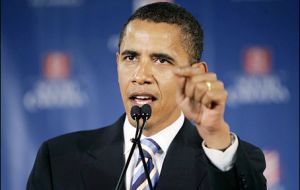MercoPress. South Atlantic News Agency
Obama joins the Mercosur controversy over the incorporation of Venezuela
 Chavez threatens “basic democratic values” said the US president
Chavez threatens “basic democratic values” said the US president President Barack Obama has accused the government of Venezuela of threatening “basic democratic values” ahead of elections next year. He added that close relations with Iran and Cuba did not serve the interests of the Venezuelan people.
The US president comments to a Venezuelan newspaper coincide with the Mercosur presidential summit in Uruguay where the group is trying to definitively incorporate Venezuela as full member of the group so far blocked by the refusal of the Paraguayan Senate to vote on the issue.
Nevertheless Obama said he looked forward to the day when the US and Venezuela could work together more closely. Venezuelan President Hugo Chavez is a staunch critic of US “imperialism” in Latin America and around the world.
President Obama made his comments in an interview with the Venezuelan opposition newspaper, El Universal. He said the US was closely watching the build-up to Venezuela's general elections, due in October 2012, when President Chavez is seeking re-election.
“We have felt great concern at actions taken to restrict the freedom of the press and to erode the separation of powers that are so necessary for a democracy to flourish,” he said.
“We are concerned about government actions that have restricted the universal rights of the Venezuelan people, threatened basic democratic values, and failed to contribute to the security of the region.”
Mr Obama said the US did not “pretend to dictate” foreign policy to sovereign nations but said Venezuela had not benefited from its close ties with Cuba and Iran.
“It is up to the Venezuelan people to determine what they gain from a relationship with a country that violates universal human rights and is isolated from much of the rest of the world,” he said.
Since taking office in 1999, President Chavez has forged a close alliance with the Castro brothers in Cuba and cultivated political and business ties with Iran. He has also been a relentless critic of US policy around the world, and accused Washington of being behind an attempted coup against him in 2002.
Obama's election in 2008 led to a brief warming of ties, but Chavez soon expressed disappointment that there had been little change in US foreign policy.
Last year the US revoked the visa of the Venezuelan ambassador in Washington after Mr Chavez rejected Mr Obama's choice of a new envoy to Caracas. But despite the diplomatic tension and rhetoric on both sides, trade links remain strong, with the US importing about a million barrels of oil a day from Venezuela.
In his interview, Mr Obama said he thought people in the region had had enough of the war of words.
“I think most Latin Americans are tired of re-fighting old ideological battles that contribute absolutely nothing towards improving their lives,” he said.
In Montevideo working on an initiative from President Jose Mujica, and with the support from the other three heads of state, Cristina Fernandez, Argentina; Dilma Rousseff, Brazil and Fernando Lugo, Paraguay, Mercosur is trying to circumvent the refusal of the Paraguayan Senate, controlled by the opposition, to have Venezuela become a full member.
Chavez formally requested to join Mercosur as full member in 2006 with the support of the other members’ Executives which was followed by a quick approval from the Argentine and Uruguayan legislatives. In Brazil the process was slower, almost four years with former President Lula da Silva having to pay a big price in domestic politics favours, but in Paraguay the Senate has proved so far impenetrable to the initiative, as long as Chavez remains as president.
Furthermore there are warnings of a possible impeachment of President Lugo if the “short cut” to approve the incorporation of Venezuela ignores the “sovereignty of the Paraguayan Senate”.




Top Comments
Disclaimer & comment rules-

-

Read all commentsSomebody toss that idiot a basketball.
Dec 20th, 2011 - 09:36 am 0Seconded, Douglas.
Dec 20th, 2011 - 11:02 pm 0““I think most Latin Americans are tired of re-fighting old ideological battles that contribute absolutely nothing towards improving their lives,” he said.”
It's precisely because we no longer want to waste our time with such trifles, that many of us want to see an ecumenical South American bloc, a union of neighboring countries irrespective of each of their governments' ideological affiliation. It's the US who's constantly trying to create divisions where none should exist.
And if Obama cares so much about keeping democracy safe from authoritarian attacks, he shouldn't have signed the awful National Defense Authorization Act - a.k.a., the indefinite detention bill. Go mind your own country's business, parochial dumb troll.
Commenting for this story is now closed.
If you have a Facebook account, become a fan and comment on our Facebook Page!